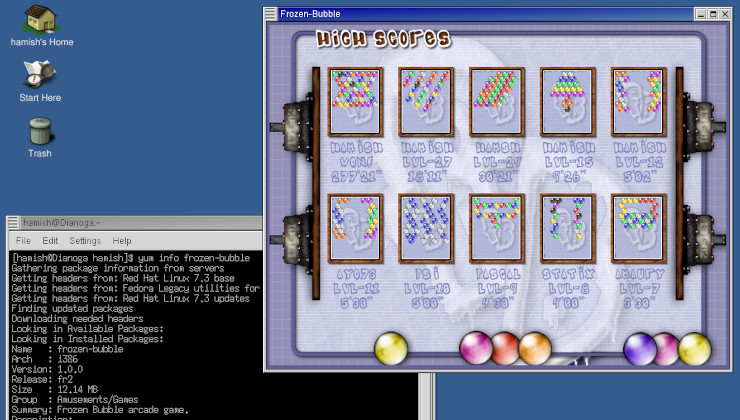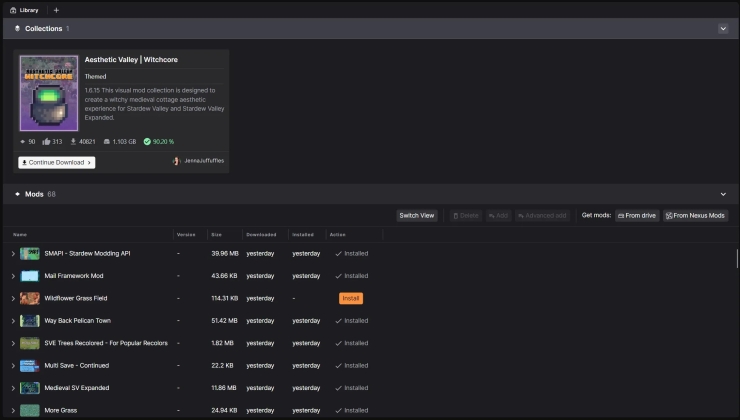System76 [Official Site], the hardware vendor that focuses on putting out well-supported Linux laptops, desktops and servers are teasing something new.

I've been following their CEO Carl Richell on Twitter for a while, watching the progress they're making towards their new desktop line and it's always fun to see the pictures. It's good to see a Linux hardware specialist doing so well that they can setup their own full production line.
As for the teaser, named Thelio, which could end up being the actual name for their new unit here's what they said:
System76 is releasing a new open-source computer, available for preorder next month. In the coming weeks, before the finalized hardware is announced, a four-part animation will be released weekly, with design updates hidden within a game portion of the story.
The story itself contains different worlds, each representing an antithesis to open source ideals. These themes are utilized to draw attention to the importance of open source in the evolution of technology. The parallel drawn between open source and the Thelio computer also helps System76 celebrate its milestone as the company transitions to manufacturing its own open hardware. CEO Carl Richell has been striving to achieve this goal since the company’s inception in 2005, and is eager to bring the new hardware to customers and open source fans alike.
Part of the problem with a lot of places, is that they're all essentially doing the same thing and only competing on price and delivery. So we're now going to have a Linux hardware vendor doing something truly unique, that's why I find this so exciting.
Find out more about it on their blog post and the official teaser website.
Their chipsets are still crap. Everytime I use an AMD system, it has random issues.
Ironically, Nvidia made pretty good chipsets for AMD CPUs (nForce). But then AMD bought ATI...
Ha, yeah the aforementioned USB issue was on an nForce board. The first AMD based system I ever built was so terrible I had sworn off any non-nVidia chipsets for them. Then I had that issue on the nForce one, which made me swear off MSI.Their chipsets are still crap. Everytime I use an AMD system, it has random issues.
Ironically, Nvidia made pretty good chipsets for AMD CPUs (nForce). But then AMD bought ATI...
its not Thelio, its Thel.io , like in itch.ioWe literally quote them saying it in the article.
"animation"
not really an animation, more like animatics:
https://www.youtube.com/watch?v=AXxk8GsR4So
yes, but they are wrong in their definition.
its not Thelio, its Thel.io , like in itch.io
That's simply not true, which you could have discovered yourself if you've visited the link you are talking about.
ok, there is an issue here...
in the URL and in the end of the video, it says thel.io
but on the page and in many parts of the subtitles of the video it says thelio.
looks like an confusion in branding...
Reasons I stay away from AMD.To answer your question simply put let's summarize it that way.I want to believe, but its probably going to be all Intel and Nvidia and really just going to be a marketing gimmick. If they really cared they would've made an AMD based product by now.
Doesn't the AMD graphics still require binary firmware blobs? Fairly certain they're still not 100% open source. And there is always the microcode.
1 ) When Linux users buy hardware they have a tendency to buy at the top tier of our catalogue
2 ) Being a bit less cagy and parting ways with the old days of putting patents on everything give us good image
3 ) Said newly acquired good reputation seems to sway linux users towards us rather than Intel
4 ) How about we very slowly point for point cater to them to see where it goes and if the trends keeps on making us money.
In other words AMD just like Intel is playing the incrementalism game ... Fine let's play it then. And Well AMD is just playing a faster incrementalism game than Intel is ... let's reward them then .
At least that's how I see it.
1) Their chipsets are still crap. Everytime I use an AMD system, it has random issues. Like USB randomly dying until I pull out the CMOS batery.
2) nVidia simply has better cards/features. For example, G-Sync is supported on Linux, Freesync is still questionable last time I looked it up.
I try to switch it up every few builds or so, but keep running into these problems. I really wish we had an alternative. RISC-V have all the Spectre issues?
Well, AMD isn't all roses, and Intel hardly does less than AMD in the OpenSource arena. I think it has more to do with anti-monopoly on the Laptop market, but even that ignores the x86 monopoly on Laptops and above.
If there are alternative architectures to x86 (which is closed-source BTW), and a decent Graphics chip architecture manufactured by a different company, I'd rather go with that, even if that means last era performance, and very few binary packages. Xonotic, 0AD and a bunch more will be ported quickly, SDL ports can be modified to work, and I'm sure if Linux has an official architecture with official hardware support, Wine will have builds too.
Well, AMD isn't all roses, and Intel hardly does less than AMD in the OpenSource arena. I think it has more to do with anti-monopoly on the Laptop market, but even that ignores the x86 monopoly on Laptops and above.Honestly this is wishfull thinking to think that the vast breadth of applications would be ported to a new architecture for a better or for worse a mass scale architecture migration would require some real downtime for just about everybody. I'm not saying it won't happen. But in the mean time the most realistic approach is to do what System 76 has been doing being a manufacturer and slowly but surely pushing the envelope and showing x86 manufacturers that it is in the end in their best interest to simply just open the platform so that roadblocks stop being thrown at them.
If there are alternative architectures to x86 (which is closed-source BTW), and a decent Graphics chip architecture manufactured by a different company, I'd rather go with that, even if that means last era performance, and very few binary packages. Xonotic, 0AD and a bunch more will be ported quickly, SDL ports can be modified to work, and I'm sure if Linux has an official architecture with official hardware support, Wine will have builds too.
Well, AMD isn't all roses, and Intel hardly does less than AMD in the OpenSource arena. I think it has more to do with anti-monopoly on the Laptop market, but even that ignores the x86 monopoly on Laptops and above.Honestly this is wishfull thinking to think that the vast breadth of applications would be ported to a new architecture for a better or for worse a mass scale architecture migration would require some real downtime for just about everybody. I'm not saying it won't happen. But in the mean time the most realistic approach is to do what System 76 has been doing being a manufacturer and slowly but surely pushing the envelope and showing x86 manufacturers that it is in the end in their best interest to simply just open the platform so that roadblocks stop being thrown at them.
If there are alternative architectures to x86 (which is closed-source BTW), and a decent Graphics chip architecture manufactured by a different company, I'd rather go with that, even if that means last era performance, and very few binary packages. Xonotic, 0AD and a bunch more will be ported quickly, SDL ports can be modified to work, and I'm sure if Linux has an official architecture with official hardware support, Wine will have builds too.
Unless things have changed recently, System76 isn't a manufacturer. The sell System76 branded Clevo/Sager laptops.
[Edit]I guess I'm ignoring the desktop segment. But then, I'm not sure that screwing parts into a case makes them a manufacturer there either.[/Edit]
Last edited by hummer010 on 28 Sep 2018 at 3:10 pm UTC
They have been slowly but surely making custom UEFIs on those Clevo's to get rid of same nasty Intel microcode shenanigans here and there. At the UEFI level they already are system designers both on laptops and Desktops.Well, AMD isn't all roses, and Intel hardly does less than AMD in the OpenSource arena. I think it has more to do with anti-monopoly on the Laptop market, but even that ignores the x86 monopoly on Laptops and above.Honestly this is wishfull thinking to think that the vast breadth of applications would be ported to a new architecture for a better or for worse a mass scale architecture migration would require some real downtime for just about everybody. I'm not saying it won't happen. But in the mean time the most realistic approach is to do what System 76 has been doing being a manufacturer and slowly but surely pushing the envelope and showing x86 manufacturers that it is in the end in their best interest to simply just open the platform so that roadblocks stop being thrown at them.
If there are alternative architectures to x86 (which is closed-source BTW), and a decent Graphics chip architecture manufactured by a different company, I'd rather go with that, even if that means last era performance, and very few binary packages. Xonotic, 0AD and a bunch more will be ported quickly, SDL ports can be modified to work, and I'm sure if Linux has an official architecture with official hardware support, Wine will have builds too.
Unless things have changed recently, System76 isn't a manufacturer. The sell System76 branded Clevo/Sager laptops.
[Edit]I guess I'm ignoring the desktop segment. But then, I'm not sure that screwing parts into a case makes them a manufacturer there either.[/Edit]
And with their new manufacturing line that this article is all about they will start designing their own systems from the ground up.
So yes you're info is outdated and you might wanna check out what they have been up to and how much intel wasn't exactly a fan of their custom UEFI decisions .
Well, AMD isn't all roses, and Intel hardly does less than AMD in the OpenSource arena. I think it has more to do with anti-monopoly on the Laptop market, but even that ignores the x86 monopoly on Laptops and above.Honestly this is wishfull thinking to think that the vast breadth of applications would be ported to a new architecture for a better or for worse a mass scale architecture migration would require some real downtime for just about everybody. I'm not saying it won't happen. But in the mean time the most realistic approach is to do what System 76 has been doing being a manufacturer and slowly but surely pushing the envelope and showing x86 manufacturers that it is in the end in their best interest to simply just open the platform so that roadblocks stop being thrown at them.
If there are alternative architectures to x86 (which is closed-source BTW), and a decent Graphics chip architecture manufactured by a different company, I'd rather go with that, even if that means last era performance, and very few binary packages. Xonotic, 0AD and a bunch more will be ported quickly, SDL ports can be modified to work, and I'm sure if Linux has an official architecture with official hardware support, Wine will have builds too.
I disagree. The things that need porting are the things that generate/execute machine code. For compiled software it’s the compilers, most interpreters can be ported by simply recompiling, and given open hardware/software it won’t take much time.
The key point is allowing most people to modify the source code and not distribute machine code directly. It doesn’t even have to be open source, just a form of bytecode that can be reinterpreted on the spot.
I disagree. The things that need porting are the things that generate/execute machine code. For compiled software it’s the compilers, most interpreters can be ported by simply recompiling, and given open hardware/software it won’t take much time.Again you look at it like a tech minded person, go and try to have that very same convo and say that very same thing to a tech illiterate boss of a company that only sees computers as nothing more than a type-writer combined with a calculator and let's see how well they will react.
The key point is allowing most people to modify the source code and not distribute machine code directly. It doesn’t even have to be open source, just a form of bytecode that can be reinterpreted on the spot.
Again it's not gonna happen over night and it will take time a time that is measured in decades to reach such a goal. Rather than dream about what could be in the distant future how about we stay grounded and start where it needs to start changing the ways companies are behaving regarding their code and hardware architectures...
Maybe Thelio openhardware computer is made from [SiFive](https://www.sifive.com/) development + extension board who knows. What do you think ?If it is I'd be very surprised AND intrigued I don't really see System 76 engaging themselves in the RISC-V adventure right now. Heck even the guys defending its potential are saying in their conferences "look it's a toy for you to tinker with for now don't expect huge number of boards being floating around like the Raspberry PI we're nowhere near THAT ready"
So that would be kind of surprising generaly people who defend an alternative platform stop being cautious early in the developement of their project/architecture so if even they feel not ready it must be real not ready.
It's so open source and free that it will cost you fortune to own. lol Seriously, while it's great that System 76 is a big Linux supporter I could build a pc that is top notch for far less than they charge for a decent laptoplPesky economies of scale if only there was a way to sway you ...
Sorry it's not an attack i'm just being facetious here. I know it sucks to have to be the ones that pay the brunt and the high price so that they can gain momentum enough to have lower prices but that's economies of scale for ya.
Same thing happened in the 80s / early 90s with computers. The IBM compatibles were expensive as hell until the demand for them brought the price down and killed off all the custom chip computers (Atari ST, Commodore Amiga, and in a lesser way, Macintosh). Now everything is x86 except ARM, which is slowly gaining some laptop install base.It's so open source and free that it will cost you fortune to own. lol Seriously, while it's great that System 76 is a big Linux supporter I could build a pc that is top notch for far less than they charge for a decent laptoplPesky economies of scale if only there was a way to sway you ...
Sorry it's not an attack i'm just being facetious here. I know it sucks to have to be the ones that pay the brunt and the high price so that they can gain momentum enough to have lower prices but that's economies of scale for ya.
If RISC-V can ride the open source hardware wave, and fix CPU vulnerabilities that x86 and most others with speculative execution have, then there is a decent chance for adoption.
If RISC-V can ride the open source hardware wave, and fix CPU vulnerabilities that x86 and most others with speculative execution have, then there is a decent chance for adoption.Ironicaly I'd like for RISC-V to take back a bit more the route of dedicated processors but I doubt we will ever see a turn back to that and speculative execution and other shenanigans will probably stay with us for long.
General purposes processors just make more sense economically (not ecologically though) but right now they're just at the phase of trhowing some prototyping boards to see what people will do with them.
I hope RISC-V finds it's niche somewhere and starts growing but blame it on my age me being french or whatev's I'm just not seeing the platform taking off quickly.









 How to set, change and reset your SteamOS / Steam Deck desktop sudo password
How to set, change and reset your SteamOS / Steam Deck desktop sudo password How to set up Decky Loader on Steam Deck / SteamOS for easy plugins
How to set up Decky Loader on Steam Deck / SteamOS for easy plugins
See more from me